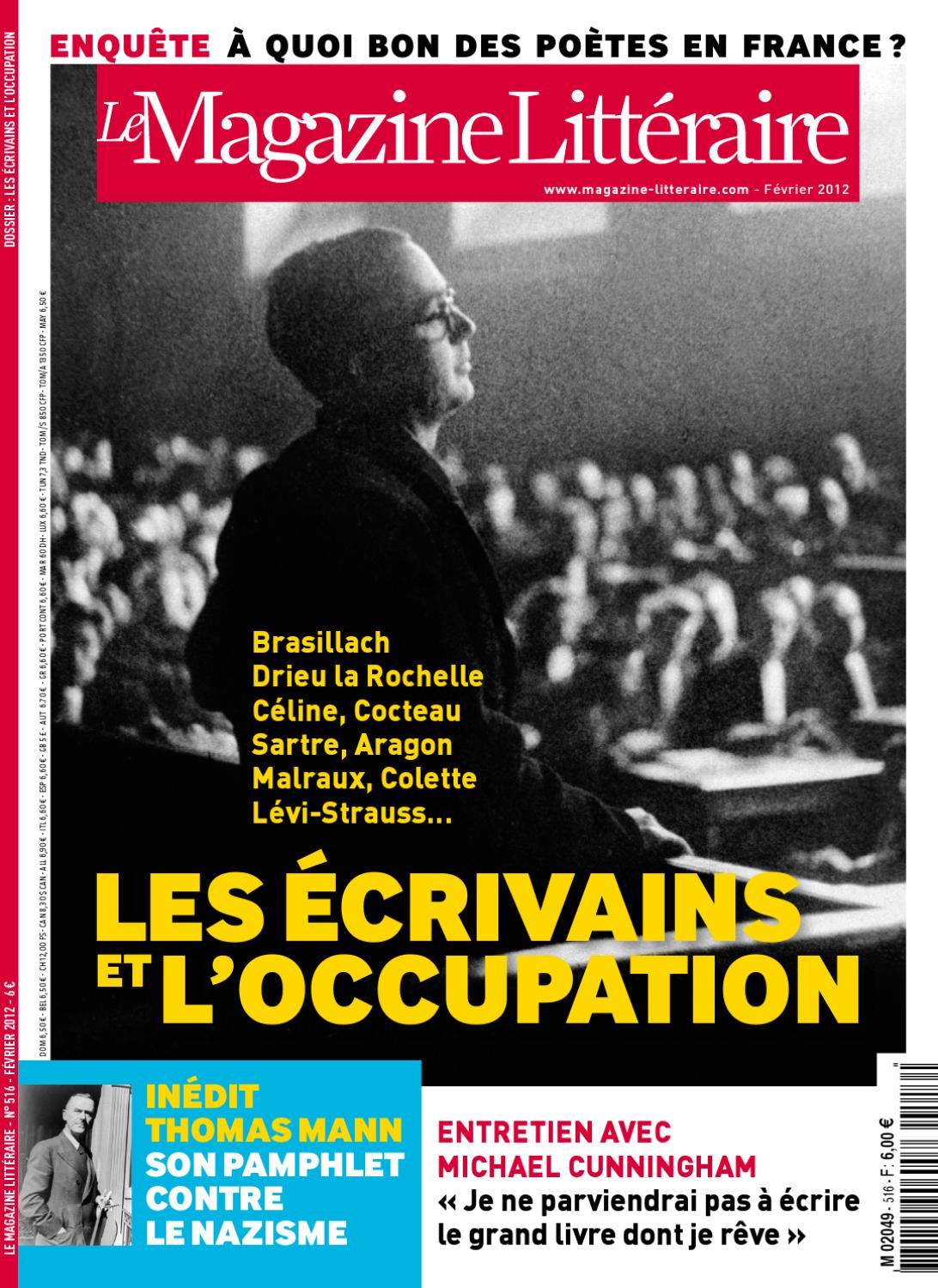Giono, Guitry, Colette, Sartre… What did these writers do during the Occupation?
They were writers during the Occupation, expressed themselves loud and clear or remained in the shadows... How did these writers position themselves during these dark years of history? Giono, Colette, Guitry, Sartre, Bernanos… here are some literary journeys, between dissidence and compromise.
Giono clings to a tarnished earth
September 1939, it is the general mobilization. In Manosque, where he lives, Jean Giono, who turned 20 in Verdun, was arrested and interned for "pacifist activities", which he argued in Refus d'obéissance in 1937. Released a few weeks later, he resumed his modest lifestyle. The "dark years" will be among his most fruitful: he works on several plays, film scripts, translation projects, several novels. Still, Giono is considered a collaborationist writer.
Why? In 1929, his novel Colline sung about nature, the peasants, the return to the land, and we saw in him a sympathetic “regionalist” author. But, in June 1940, this theme was exalted by Vichy, and the collaborationist press opened its columns at Le Manosquin. The manuscript of Les Deux Cavaliers de l’orage is promised to La Gerbe. The Triumph of Life is serialized in Le Figaro. Laudatory articles flourished in Comœdia, and two reports on Giono appeared in Signal (including one in May 1944).
From 1943, German soldiers passing through Manosque made the detour to get a kind word, a dedication... But it was also from that year that Giono's house served as a temporary refuge for many many young people fleeing the STO and joining the growing maquis in the region. The only condition: not to come armed...
On August 15, 1944, the Allies landed in Provence, Manosque was liberated shortly after. The spectacle offered by the resistants of the 25th hour revolts the writer. If Giono has sympathy for the idealists who go to fight with arms in hand, he is more reserved about their leaders, well sheltered in the rear, who wait to be able to occupy positions. For Les Lettres françaises, just out of hiding, Giono is one of the "novelists of cowardice". After five months in prison, he was released on January 23, 1945 and went back to writing, the story of a hussar on the roof...
Sacha Guitry, the art of the cheater
The 1930s were among the most prosperous of Sacha Guitry's life. His plays triumphed, he directed ten films, including Le Roman d'un cheater, entered the Académie Goncourt, refused the Académie française. The armistice surprises him in cure in Dax. He immediately went back to Paris where he intended to maintain the French spirit through his work as an author and performer. From 1940 to 1944, the German authorities refused nothing to "Mr. Sacha"...

Very quickly, he obtained permission to reopen the Théâtre de la Madeleine, where he performed Pasteur and Vive l'Empereur, plays presented as an ode to French genius. In 1942, he refused funds from the Continental (the official French production company under the Occupation, financed by the IIIth Reich) to shoot Le Destin Fabulous de Désirée Clary, a story of a mistress of Napoleon who allows him to slip a few anti-German pikes. During the war, Sacha Guitry also used his notoriety to demand the release of Tristan Bernard and, in vain, that of Max Jacob.
Genius for some, traitor for others, Sacha Guitry made headlines for his social life during the Occupation. In 1940, he witnessed the return of the ashes of the Aiglon. In 1942, he was at the inauguration of the Arno Breker exhibition and enjoyed an interview with Göring, who did not hide his admiration for him. Received several times in Vichy by the marshal, Sacha Guitry submits to him the model of his book project From Joan of Arc to Philippe Pétain, the final version of which will be presented on June 23, 1944 during a charity gala at the Opera. from Paris…
On August 23, 1944, he was arrested in a dressing gown and slippers. Apprehended without a warrant or official mission by a resistance group, the artist was released after sixty days of detention. From his time in the jails of the Resistance, Guitry will write a plea pro domo, and will get away with it, as always, with a good play on words: “The Liberation, I can say that I was the first to be warned. »
Colette, “self-patriot”
In 1940, Colette was 67 years old. She has lived since 1938 in her last apartment, at the Palais-Royal, where she has a view of the gardens: a decisive window, when the arthritis already declared will immobilize her little by little. After the exodus, she chose to return, although her husband Maurice Goudeket was Jewish: “I used to spend my wars in Paris. For five years, she published: Julie de Carneilhan, Chambre d'hôtel, Gigi... She did not deprive herself of remunerative writing, enough to pay for the black market, restaurants, medical treatment.
When, on December 12, 1941, Goudeket was arrested and interned in Compiègne, she devoted herself to contacts to obtain his release, which took place on February 6, 1942. She then agreed to compose a dictation for the Secours national, participated in the marshalist monument From Joan of Arc to Philippe Pétain, book directed by Sacha Guitry – in an article saying only his admiration for Balzac.
She gave La Gerbe, in November 1942, a poetic celebration of her native region that the fascist weekly framed with articles praising the historical and racial proximity of the Burgundians and the Aryans: "It is painful to see the name -there respected by Colette to serve such a task", noted Les Lettres françaises clandestines.
This “patriot of herself”, as Elsa Triolet called her, was thus occupied in saving, without losing herself too much, her life and her husband. At the Liberation, the collaborators claimed to condemn her ingratitude: it took Cocteau's insistence for her to agree to sign the petition in favor of Brasillach; Guitry will pursue her with his acrimony.
“I am humbly among those who only waited,” wrote Colette in L’Étoile Vesper. No heroism, then; compromises, a few compromises, the undoubtedly decisive friendship of the German ambassador Otto Abetz and his wife Suzanne. But nothing today introduces more to the ambiguities of a gray period than his texts from that time, and particularly From my window, close to the intimate and the everyday.
François Mauriac, the dissident academician
In the disarray of the armistice, two chronicles, in which he mentions in passing "the horde of invaders...
Share this article Giono, Guitry, Colette, Sartre… What did these writers do during the Occupation?Ouest-France.fr


![PAU - [ Altern@tives-P@loises ] PAU - [ Altern@tives-P@loises ]](http://website-google-hk.oss-cn-hongkong.aliyuncs.com/drawing/179/2022-3-2/21584.jpeg)

![Good deal: 15% bonus credit on App Store cards of €25 and more [completed] 🆕 | iGeneration Good deal: 15% bonus credit on App Store cards of €25 and more [completed] 🆕 | iGeneration](http://website-google-hk.oss-cn-hongkong.aliyuncs.com/drawing/179/2022-3-2/21870.jpeg)





Related Articles